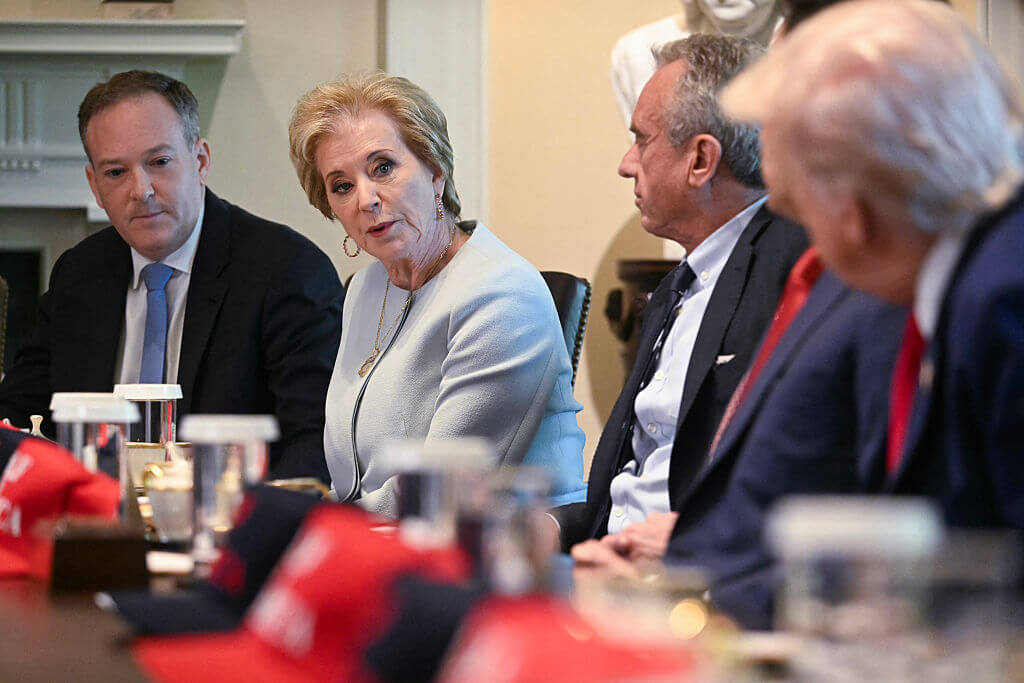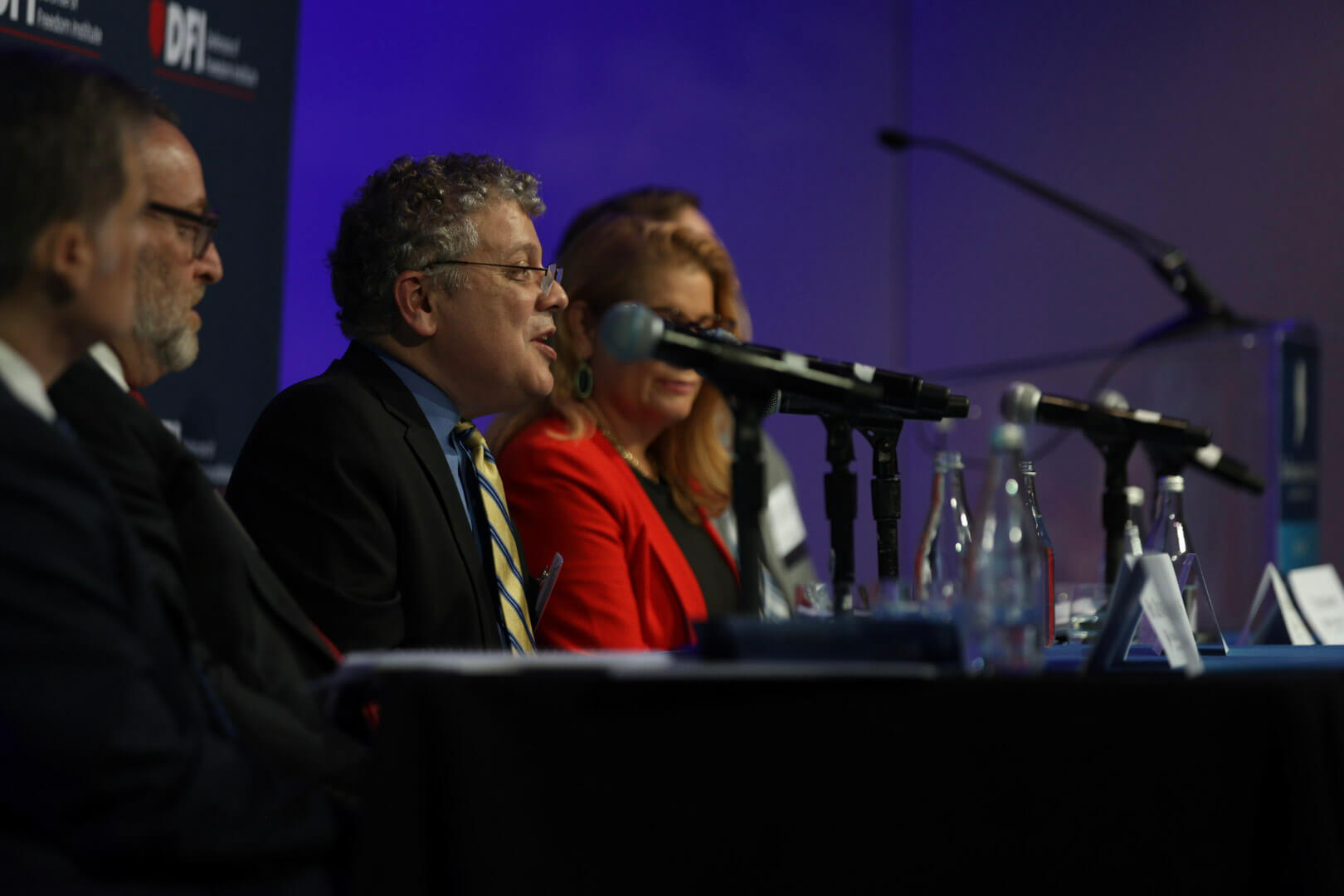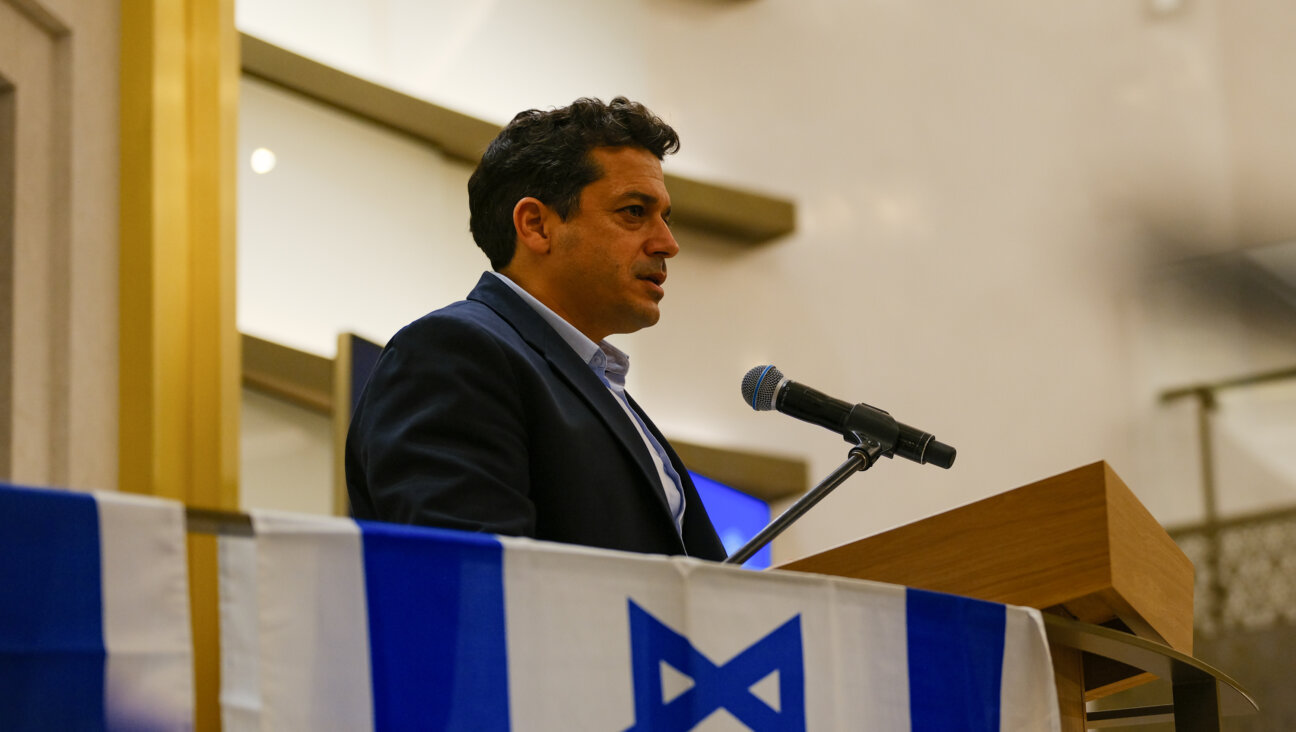Why Trump’s antisemitism crusade is causing ‘apoplexy’ for some conservative lawyers
At a Federalist Society conference, some legal experts said they supported Trump’s goals but questioned his tactics

Linda McMahon, the education secretary, at a cabinet meeting at the White House on April 30. Photo by Jim Watson/AFP via Getty Images
WASHINGTON, D.C. — After years of accusing President Joe Biden and the Democrats of being too soft on campus antisemitism, Republicans retook the White House and have embarked on an unprecedented campaign against universities.
In the name of protecting Jewish students, the Trump administration has launched dozens of investigations, stripped federal funding from some of the country’s most prominent schools and threatened more of the same for any institutions that don’t fall in line.
But rather than reacting with euphoria, several conservative legal experts who gathered for the Federalist Society’s education policy conference here last week were ambivalent when it came to Trump’s tactics: While they supported reigning in left-leaning universities, some weren’t sure the White House’s approach respected free speech.
“There’s just a difference between saying ‘From the river to the sea,’ on one hand, and saying ‘Death to Jews,’ while pointing at Jews, on the other hand,” said Paul Clement, who served as President George W. Bush’s solicitor general and remains one of the nation’s most revered litigators.
There was certainly no love lost between universities and speakers at the conference, which took place Wednesday in the basement of The Ritz-Carlton hotel. But there was a sense that in its righteous zeal to “force things to the right,” as Ken Cuccinielli put it during one panel, the White House was pushing into areas where “the law is uncertain.”
“We’re dealing with a clash between the First Amendment and removing aliens,” said Cuccinielli, who ran Citizenship and Immigration Services during the first Trump administration.
It was striking to hear this from Cuccinielli, who otherwise shares almost no common ground with the liberal college professors and opponents of the Trump administration who have been saying the same thing for months.
And Cuccinielli wasn’t alone.
“The demand letter to Harvard gave me apoplexy,” Sarah Parshall Perry, a vice president at Defending Education, which fights classroom “indoctrination,” told the audience during another panel. “There was a curricular audit that made me very, very uncomfortable and that would seem to fly directly in the face of academic freedom and the First Amendment.”
Perry remained otherwise enthusiastic about federal pressure on universities, which she accused of defending Hamas and “platforming tyranny,” but the pause that she and others felt about at least some of the tactics being used may stem from the administration’s approach to countering antisemitism, which can be difficult to follow.
“The entire process is messed up... My message is: Get it right.”Tyler CowardFoundation for Individual Rights and Freedom
The settlement agreements with Columbia and Brown, for example, relied on different legal standards — one university was required to prevent harassment that was either “severe” or “pervasive,” while the other only had to address behavior that was “severe” and “pervasive” — and the government has offered shifting justifications for cutting off grant funding to the schools it is investigating.
Tyler Coward, from the Foundation for Individual Rights and Expression, said at the gathering that the Federal Acquisition Service has ended most of the contracts under a provision that allows them to do so “for convenience.” But at the same time, government lawyers have said they’re canceling them because the universities have violated civil rights law — which would require a multi-step process for stopping federal funding that the Trump administration has not followed. “The entire process is messed up,” Coward said. “My message is: Get it right.”
Another messy misstep: The Harvard letter that Perry referenced was reportedly “unauthorized” and sent by mistake with demands so sweeping that the university decided to litigate — notching an initial victory earlier this month — rather than negotiate a settlement.
The letter was authored by a Health and Human Services attorney on the White House’s antisemitism task force, even though most campus civil rights work has been routed through the Justice Department and Education Department.
When Education Secretary Linda McMahon spoke at the conference on Wednesday morning, she expressed hope that the government could still reach a settlement with Harvard. But when asked what the “problem at Harvard was” she referred to what sounded like the description of an incident that occurred 200 miles away at the Cooper Union in New York City where “we saw students that were locked in the library and other students pounding outside on the glass of the library.”
The details of what, exactly, the White House is trying to prevent are murky, so it can be hard for even sympathetic conservatives to determine whether the government is infringing on protected — if controversial — slogans like the one Clement referenced during his lunchtime speech, or rescuing Jewish students from an angry mob: “We don’t even have an agreed upon definition of antisemitism,” Clement said.

And not everyone at the conference, run by an organization known for incubating conservative jurists, including more than half of the current Supreme Court, was sympathetic to the White House. Ilya Somin, an originalist legal scholar from Geoge Mason, rejected the premise that the Trump administration was genuinely trying to improve the intellectual climate for Jews on college campuses.
“If I were the administration, and I was concerned about intellectual environments, I would first clean up my own house.”
“For example, I would stop associating with people like Tucker Carlson and other known antisemites, Holocaust deniers — I would fire people they have hired at the Department of State and the Department of Defense with an extensive history of antisemitism — and only then would I consider myself worthy of concerning myself with the intellectual environments of other institutions.”
That is not to say the conservative legal world is about to turn on Trump. Clement himself helped represent Jewish students who successfully sued the University of California, Los Angeles for allowing protesters to limit access to the center of campus, and he warned the gathering that if academic freedom “just means that a whole bunch of liberals get to say all the crazy things they want and have no consequences” then “it’s really not worth fighting for.”
Cuccinielli framed the tension as one between university administrators who have coddled Hamas supporters, on the one hand, and the rights of Jewish students who have felt afraid to freely express themselves, on the other. The White House is using what “you might consider rough tools to achieve more freedom of expression,” he argued.
And Ken Marcus, another Trump administration veteran who oversaw civil rights enforcement at the Education Department during the president’s first term, mounted perhaps the strongest defense of the White House’s approach at the conference. He said it had “a forcefulness, a muscularity, and I would say, a creativity that is greater than what we have seen before” and that was “absolutely what has been needed in the civil rights crisis that we have faced on college and university campuses.”
“Over and over again, we’re seeing cases involving physical violence, various forms of obstruction, vandalism and so on,” Marcus added, “which is why, although the First Amendment is litigated sometimes in these cases, it’s usually not about that.”
This is often a fuzzy line, as in the case of the Florida State student who was charged with assault for pushing someone but almost certainly only due to her offensive speech that preceded the contact.
Whether the distinction Marcus sought to make holds up in the months and years to come — including in front of the many judges that passed through Federalist Society ranks — may be the deciding factor in how durable Trump’s campus crackdown proves to be.

















